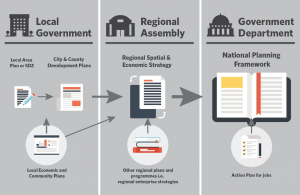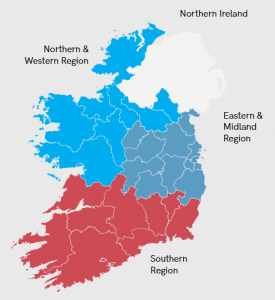//
The long process of developing a National Planning Framework under Project Ireland 2040 is nearing its end, with the publication of the three regional Spatial and Economic Strategies anticipated shortly. Each of the three regional assemblies (Eastern and Midland, Southern, and Northern and Western (see the map below) is at a slightly different stage in the process but have either completed (EMRA) or are currently consulting on material amendments to draft Regional Spatial and Economic Strategies (SRA and NWRA). These will feed into the spatial planning process as depicted in the graphic below which shows the relationship between the different planning levels.
Source: Eastern and Midland Regional Assembly https://emra.ie/regional-spatial-and-economic-strategies-2/
The Eastern and Midland Regional Assembly published its Regional Spatial and Economic Strategy and accompanying documents in June 2019 (see here for more information).
The Southern Regional Assembly has recently published its Proposed Material Amendments (PDF 3.5MB) and associated Environmental Reports for public consultation. The consultation period is from 12th September 2019 until 11th October 2019, (dates inclusive). The WDC will review the material amendments relevant to the Western Region (largely as they relate to Clare). Our previous submission is discussed here.
Finally, and of most interest to the WDC, because of its coverage of the Western Region (aside from Clare which is part of the Southern Region), the Northern and Western Regional Assembly is currently consulting on the Material Amendments (5.6MB) to the draft RSES. The closing date for comments on these Material Amendments is 11 October. More information about how to input to this process is here.
The three Regional assemblies cover the areas shown in the map below.
The WDC has made submissions and attended consultation meetings throughout the development of the National Planning Framework and the Regional Spatial and Economic Strategies (see WDC Insights posts here, here and here).
The WDC is finalising its inputs to the consultation on the Material Amendments in the Northern and Western Region, mindful that considerable consultation has already taken place and that the proposedamendments have been included by the elected members of Regional Assembly. Therefore, the WDC comments will be confined to specific details of the amended text.
Proposed amendments
The material amendments largely relate to the RGCSPs but there are a number of other new Regional Policy Objectives and amendments to the previous RPOs (see this document for the full detail of all the material amendments under consultation). A small selection of the new RPOS (relating to the region as a whole) are outlined here.
There is a proposed overarching environmental regional policy objective:
The Assembly supports the integration of biodiversity considerations in a positive, proactive and precautionary way and promotes the protections of the environment and bio-diversity conservation as key principles of the strategy.
There is increased emphasis on collaboration among Local Authorities and the Regional Assemblies:
It is an objective to establish a collaborative approach between the Regional Assemblies (NWRA, SRA), the Local Authorities and other stakeholders to enable all their metropolitan areas to collaborate with each other to harness their combined potential as an alternative to development of Dublin.
A number of RPOs relating to Tourism assets have been amended (e.g. 24-26, 31) :
24.To support working with relevant landholders and recreational / tourism agencies to increase access to the Countryside and to our Coastal area’s, and to ensure maintenance and access to the existing network of trails, paths, ways etc.
25.To support the maintenance of, and enhanced access to state lands, such as National Parks, Forest Parks, Waterways together with Monuments and Historic Properties, for recreation and tourism purposes.
26.To support the preparation and implementation of Visitor Experience Development Plans (VEDPs) within the Northern & Western Region, to underpin the overarching regional tourism benefits and to promote the natural and cultural assets of the Regions.
31.To ensure provision is made for the expansion in accommodation, and facilities within key destination towns, such as Carrick on Shannon, Cavan, Roscommon Town & Athlone, together with necessary supporting infrastructural investments, including improvements in the public realm, Transport links, accommodation, the night time economy, and sustainable development of our natural & built economy
The WDC welcomes a new RPO on the Bioeconomy:
The Assembly supports the future proofing of Infrastructure Planning to allow for the potential upgrading of existing industrial sites to bio-refining plants while also supporting the use of bio-renewable energy for production of bio-based products.
In relation to Ports the proposed RPO now includes Killybegs:
The Assembly supports the designation of Galway and Killybegs as Tier 1 Ports, subject to environmental and visual considerations as well as transport and economic viability requirements.
New RPOs are included on Climate Action and for the designation of National Parks:
The Assembly will support the preparation of local climate strategies by CAROs and Local Authorities to address vulnerability to climate risks and prioritise actions in accordance with the principles within the National Adaptation Framework and the National Mitigation Plan.
The Assembly supports the advancement of the zone of North Sligo/North Leitrim (Ben Bulben and its hinterlands) and the area surrounding Lough Arrow/Lough Key as potential National Parks/National Recreation Areas. It also supports collaboration in this regard with stakeholders including NPWS, Local Authorities, Department of Culture Heritage and the Gaeltacht.
In relation to roads, the following amendment is proposed (listing more roads than the original draft RSES):
The delivery of the following projects shall be pursued, in consultation with and subject to the agreement of TII, through pre-appraisal, early planning and to construction as priority projects to be delivered to an appropriate level of service in the medium term.
-
- N15 Sligo to BundoranN16 Sligo to Blacklion
- N13 Manorcunningham to Bridgend/Derry
- N59 enhancement
- N61 Athlone to Boyle improvement
- N63 Galway to Longford improvement
- N56 lnver to Killybegs
- N15 Stranorlar to Lifford
- N13 Stranorlar to Letterkenny
- N3 North of Kells to Enniskillen, via Cavan and the A509 in Fermanagh;
- N54 (NS) Cavan to Monaghan Town;
- N55 (NS) Cavan to Athlone;
- N26 and N58 (NS) linking Ballina to N5.
Finally, a RSES Oversight Committee is proposed, which will be established to ensure oversight of the implementation, monitoring and reporting of progress in implementation of the RSES, as well as identifying opportunities to drive Regional Development, and suggest sources of funding, fostering partnerships / new collaborations.
This is only a small selection of the proposed amendments. It is worth taking the time to consider all of the proposed amendments and provide feedback to the Northern and Western Regional Assembly by 11 October 2019. The WDC will make its submission shortly and it will be available on our website.
Conclusion
The completion of all of the Regional Spatial and Economic strategies will be a very significant achievement, the culmination of years of work since they were first announced and extensive consultation and stakeholder engagement. Of course, this means the work of implementation becomes a priority. The incorporation of the strategy goals and targets into Local Area Plans and City and County Development Plans is to follow, and wider implementation of the strategies to ensure that the growth and employment targets set out the in the NPF are achieved, along with ten National Strategic Outcomes (NSOs listed below) is essential:
- Compact Growth
- Enhanced Regional Accessibility
- Strengthened Rural Economies and Communities
- Sustainable Mobility
- A Strong Economy Supported by Enterprise, Innovation and Skills
- High Quality International Connectivity
- Enhanced Amenity and Heritage
- Transition to a Low-Carbon and Climate-Resilient Society
- Sustainable Management of Water Waste and other Environmental Resources
- Access to Quality Childcare, Education and Health Services
Achieving these will involve co-ordinated spending and investment and alignment of policy across all sectors (eg transport, education, enterprise and initiatives such as the Atlantic Economic Corridor) as well as through the planning process. It will require the iterative incorporation of new policies (such as the Climate Action Plan and the local Climate Adaptation Strategies (see here for example) as well as incorporating responses to economic, social and policy responses to know and unknown factors (e.g. Brexit, changes in global economic activity and any unexpected events).
We look forward to a strong, driven, implementation process responsive to the changing world and to changing priorities. With this we can be optimistic about living, working and doing business in a thriving, active and sustainable region twenty years from now.
Helen McHenry






